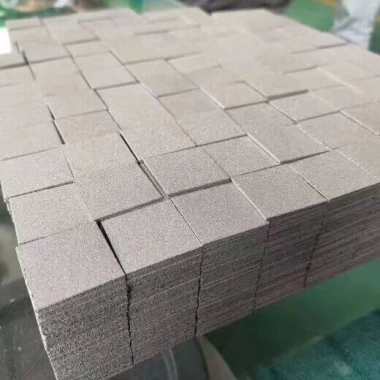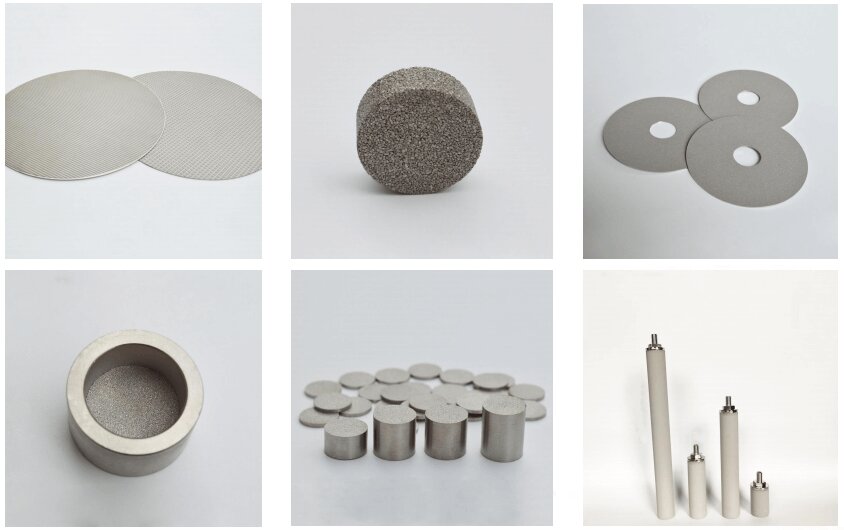Sintered titanium plate is a microfiltration element made of titanium sponge powder as raw material after filtration, shaping and sintering. It has high filtration precision, good air permeability, high mechanical strength, high material utilization, and is suitable for higher working temperatures. We can produce various special-shaped parts according to customer needs.
Porous sintered titanium plate details
1. Titanium sintered porous material is a porous material made of spherical, high-purity titanium powder as raw material, which is formed and sintered at high temperature. Features: The material contains a large number of connected pores. The pore structure is composed of regular and irregular powder particles. The size and distribution of the pores and the size of the porosity can be adjusted according to the combination of powder particle size and preparation process to meet the actual needs of customers.
2. Titanium sintered porous material specifications
| Material | Filtration accuracy | Porosity | work pressure | Operating temperature | Shapes |
| titanium powder | 0.5um-70um | 30-45% | 2.0MPa | 300℃ | tube, round |
| Product | (Diameter)Length | (Diameter) Width | Thickness | Custom made |
| Sintered porous disc | φ5-φ400mm | φ5-φ400mm | 1-20mm | YES |
| Sintered porous plate | 1-600mm | 5-400mm | 1-20mm | YES |
| Sintered porous tube | 100-1200mm | φ20-φ200mm | 1-10mm | YES |
| Sintered porous filter element | 100-1200mm | φ20-φ200mm | 1-10mm | YES |
3. Properties of titanium sintered porous materials:
1) Uniform pore diameter, stable pores and separation.
2) High porosity, low filter resistance and high permeability.
3) Good chemical stability, acid and alkali corrosion resistance, and oxidation resistance.
4) The shape is stable, no particles fall off, and meets the requirements of food hygiene and pharmaceutical GMP.
5) Good mechanical properties, low pressure difference and large flow rate.
6) Strong antimicrobial ability and does not interact with microorganisms.
7) Online regeneration, easy cleaning and long service life.
8) It has good biocompatibility and can be widely used in the field of biology.
4. Application of titanium sintered porous materials
Titanium sintered porous materials are mainly used in filter materials, electrode materials, heat transfer materials, catalyst carrier materials, noise reduction materials, etc. based on their physical structural properties.
1) Decarbonization and filtration of medicinal liquids in the pharmaceutical industry.
2) Precision filtration and gas distribution in the electrolysis gas production industry.
3) Used in the medical industry to make biological implants.
4) Filtration and ozone aeration after odor sterilization in water treatment industry.
5) Clarification and filtration in food and beverage processing.
6) Pre-filtration of reverse osmosis systems in the electronics industry.
7) Terminal filtration of petroleum products in the petrochemical industry and filtration of carbon-alkali liquids in the chemical industry.
8) High-pressure air filtration in the aerospace industry.
9) Filtration and recovery of precious metal catalysts in the fine chemical industry.
10) Electrode matrix of fuel cell, PEM water electrolyzer electrode (can be coated with Pt, etc.)
11) Catalyst carrier in gas and liquid catalytic reactions.
5. Titanium sintered porous materials are allowed to be used in:
3% hydrochloric acid, various concentrations of nitric acid, aqua regia, sea, carbonate and chloride salt aqueous solutions, etc.
6. Precautions when using titanium sintered porous materials:
1) Avoid scratches, bumps, smashes and other injuries from hard objects during installation, disassembly and cleaning.
2) Install it correctly to avoid reverse filtering. Avoid instantaneous rapid pressurization when the filter element is working.
3) When the filtration efficiency is lower than 50%, the filter element should be cleaned in time.
4) When cleaning the filter element, first use pure gas to backflush. The backflush gas pressure is 1.5 times the working pressure. Each backflush time is 3-5 seconds. Backflush 4-6 times. Then use clean liquid to backwash 3- 5 minutes, repeat 2-3 times.
5) If the filter element is not effective after online backflushing and backwashing, it should be disassembled and cleaned in time.
7. Cleaning method of titanium sintered porous materials
1) The decarbonization filter elements in the pharmaceutical and chemical industries mainly use backflushing and backwashing methods combined with ultrasonic cleaning to achieve good results.
2) Filter elements in the water production industry are mainly soaked and rinsed with 5% nitric acid.
3) The raw liquid filter element should be acid washed (5% concentration of nitric acid) or alkali washed according to the chemical properties of the filtered impurities. After soaking, it should be rinsed and cleaned with ultrasonic waves.
8. Main product list
Porous titanium plates can also be used as various filters, reverse osmosis devices, and medical materials. In short, the new material of porous titanium plate has shown its strong vitality and will be widely used in all aspects of life in the future.













